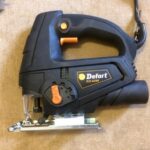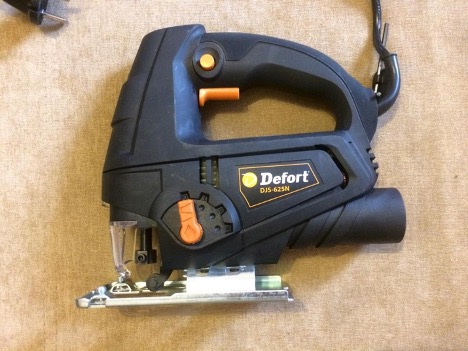What is the difference between a drill and a hammer drill? Main differences between the instruments
There are several parameters that make it easy to understand the difference between a drill and a hammer drill. All of them are related to the purpose of each tool. If the first device is used primarily for drilling, the second is equipped with an impact mechanism. This allows it to be used to crush holes even in very dense materials.
The content of the article
Impact mechanism
The differences between a drill and a hammer drill are primarily related to the mechanism that provides the impact function, that is, the impact mechanism. Quite a few drill models have this option. It allows you not only to drill, but also to make holes in dense materials, for example, in thick concrete or brick. It helps to hang a shelf and install a cornice.
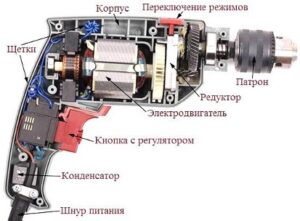
However, the instrument does not have a percussion mechanism as such. The impact occurs due to the fact that the gears rotate quickly, touch each other through the teeth and bounce off during operation. This kind of rebound is called a hit.
Moreover, it is not too strong, that is, the pressure on the material increases, but not to that extent. In addition, your hands get tired quite quickly when using the shock mode. This is due to the fact that in order to strike, you need to press the device with your weight. It turns out that if you choose a drill or hammer drill specifically for the impact function, you should choose the second option.
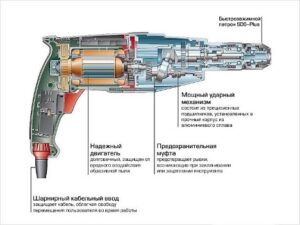
Moreover: the main purpose of a hammer drill is to crush solid material. All models, even those with not too much power, have a striking mechanism. And thanks to this, you can get a hole of even a significant diameter without making much effort and without leaning on your whole body. This is the main criterion by which it is easy to determine the difference between an impact drill and a hammer drill.
Power
Power is one of the most important indicators by which any devices from screwdrivers to concrete mixers are selected. The instruments in question are no exception. The difference between an impact drill and a rotary hammer is directly related to the main purpose of each device. Since the first device has less power and is not equipped with a hammer mechanism, its performance is lower. The second has a slightly lower figure, since this is quite enough.
Moreover, judging which is better – a drill or a hammer drill – based solely on power is not entirely objective, because:
- Both devices often have approximately the same rating. Thus, the most productive drills produce up to 2000 watts. These are percussion instruments, as well as mixers capable of mixing cement mortar.
- The more power the better, not always. So, with the same value, you definitely need to choose a hammer drill for crushing dense materials. The fact is that, as already mentioned, it is equipped with a striking mechanism, while drilling machines are not. But for most household tasks, high performance is not needed.
- Powerful devices cost several times more than models for home use. At the same time, it is not advisable to overpay money for “extra” watts.
Thus, it is necessary to correctly understand the difference between a drill and a hammer drill.These are similar tools that can even partially replace each other. But the main purpose is different - this is the factor that needs to be taken into account when choosing.
Processed material
This point is also closely related to the purpose of the devices. The difference between a hammer drill and an impact drill is that the first device can work with even the densest materials:
- concrete;
- natural stone;
- brick.
As for the drilling machine, it is mainly designed to work with the following materials:
- tree;
- stone;
- metal;
- ceramics;
- glass.
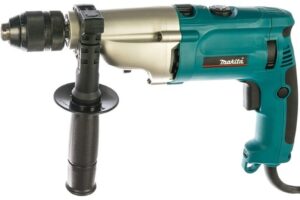
It can also be used for brick and concrete. But even in this case, it is clear what the difference is between an impact drill and a hammer drill. The latter is used specifically for working with dense materials. It is used for crushing and drilling, producing various holes, including large diameters.
Selection of nozzles
The difference between a drill and a hammer drill is quite clear from the example shown by the attachments. In the case of a drilling machine, manufacturers often sell tools without attachments as such or immediately complete them with a small set. They include drills of different diameters and shapes, they differ depending on the material being processed:
- metal;
- tree;
- concrete.
Moreover, concrete drills have an additional reinforced impact part. It also plays a role when forming holes in a brick or concrete wall.
If we talk about the difference between a rotary hammer and an impact drill, it is easy to notice that the first device has different equipment:
- Drills, a set of drills for drilling in different modes (impact, unimpacted).
- Crowns that allow you to make holes in the wall. Looking at them, you can also notice the difference between a drill and a hammer drill.Using the latest device, you can make holes of any type - blind ones are used for installing sockets, and through ones are used for installing communications, for example, pipes.
In addition, the hammer drill equipment is characterized by different types of shank - SDS maximum or plus. Depending on the operating technology, they can be used in a “dry” mode or using a water cooling system. Therefore, we can simply say that a hammer drill is a drill, and a more highly specialized one, since its main purpose is related to the impact function.
Lifetime
Another indicator that determines the difference between a hammer drill and a drill is related to the service life. It is a common belief that the first tool is more reliable because it is designed for professional tasks.
In fact, the period depends on various factors - primarily on the quality of the build, brand recognition, intensity of use (how often), as well as on the accuracy and experience of the master himself. In this sense, there is no difference between a hammer drill and an impact drill.
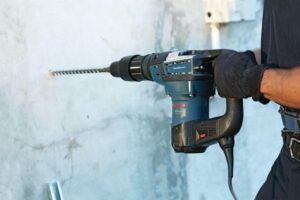
Typically, manufacturers indicate that the period of trouble-free operation is 3-5 years, declaring 1-2 years as a warranty period. But if you handle it carefully and lubricate it on time, the tool can last longer - up to 10-15 years, and sometimes up to 20 years.
Therefore, if you need to decide whether to choose a drill or a hammer drill, you should focus mainly on what tasks the device is needed for. It is perfectly acceptable to buy a tool for home use. If you use it not too often and properly maintain it, it will work properly even longer than a professional device.
Thus, do not confuse an electric drill with a hammer drill.The instruments are similar in appearance and even in design. But they are equipped with different mechanisms and solve different problems. Most often, a drill is optimal for household purposes. A hammer drill can also be rented for occasional work.

